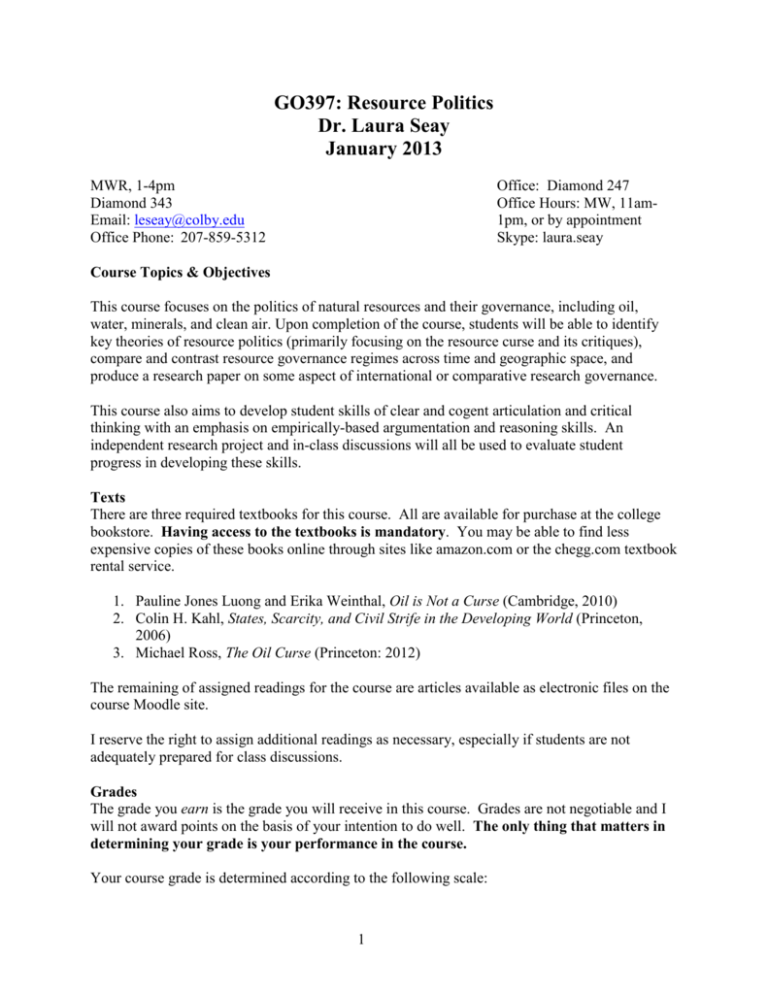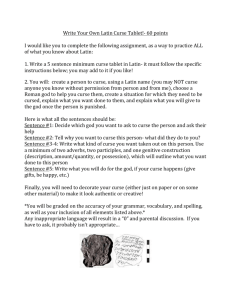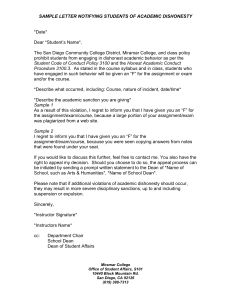PSC 477: Contemporary African Politics
advertisement

GO397: Resource Politics Dr. Laura Seay January 2013 MWR, 1-4pm Diamond 343 Email: leseay@colby.edu Office Phone: 207-859-5312 Office: Diamond 247 Office Hours: MW, 11am1pm, or by appointment Skype: laura.seay Course Topics & Objectives This course focuses on the politics of natural resources and their governance, including oil, water, minerals, and clean air. Upon completion of the course, students will be able to identify key theories of resource politics (primarily focusing on the resource curse and its critiques), compare and contrast resource governance regimes across time and geographic space, and produce a research paper on some aspect of international or comparative research governance. This course also aims to develop student skills of clear and cogent articulation and critical thinking with an emphasis on empirically-based argumentation and reasoning skills. An independent research project and in-class discussions will all be used to evaluate student progress in developing these skills. Texts There are three required textbooks for this course. All are available for purchase at the college bookstore. Having access to the textbooks is mandatory. You may be able to find less expensive copies of these books online through sites like amazon.com or the chegg.com textbook rental service. 1. Pauline Jones Luong and Erika Weinthal, Oil is Not a Curse (Cambridge, 2010) 2. Colin H. Kahl, States, Scarcity, and Civil Strife in the Developing World (Princeton, 2006) 3. Michael Ross, The Oil Curse (Princeton: 2012) The remaining of assigned readings for the course are articles available as electronic files on the course Moodle site. I reserve the right to assign additional readings as necessary, especially if students are not adequately prepared for class discussions. Grades The grade you earn is the grade you will receive in this course. Grades are not negotiable and I will not award points on the basis of your intention to do well. The only thing that matters in determining your grade is your performance in the course. Your course grade is determined according to the following scale: 1 A+ (4.0) – 98-100 A (4.0) – 94-97 A- (3.7) – 90-93 B+ (3.3) – 88-89 B (3.0) – 84-86 B- (2.7) – 80-83 C+ (2.3) – 78-79 C (2.0) – 74-77 C- (1.7) – 70-73 D+ (1.3) – 68-69 D (1.0) – 64-67 D- (0.7) – 60-63 F (0) – below 60 It is your responsibility to keep up with your grades as the course progresses. I will post your assignment grades in Moodle so that you may easily access them. Assignments Seminar Leadership – 20% Research Paper - 50% Participation – 30% Total – 100% Research Paper (50%) The research paper is the culmination of our study of resource politics. You will write a 20-page paper on a topic relating to international resource politics and governance. More details about the research paper assignment will be distributed on the second day of class. The research paper must be uploaded to Moodle by 5pm on Thursday, January 30. Seminar Leadership (20%) Each student is responsible for leading class discussion for one day of the course. The day’s leader will come to their assigned session having thoroughly studied all of the assigned readings and ready to lead his or her classmates in a discussion of the week’s topic. The leader for the day must submit a list of five analytical questions for discussion to the professor by email (leseay@colby.edu) by 8am the Friday before that week. It is your responsibility to remember the date by which your questions must be submitted. Failure to submit your analytical questions on time will result in a 10-point grade deduction. Sign-ups for seminar leadership days will occur on the first day of class. Participation (30%) Participation in this course is expected and mandatory. I will evaluate your course participation based on your attendance and the quality and quantity of comments you make in class. This is a seminar-style course and as such, it will not work if all of the students are not prepared for every class session. For students who miss class more than once, five points per additional absence will be dropped from your participation grade. If you are habitually unprepared for discussion, you will be asked to drop the course. Course Policies 1. Participation - Active participation is required in this course. Due to the nature of political discourse, we will discuss controversial topics from time to time. Students are expected to be respectful of classmates’ views and courteous towards one another. 2 2. Attendance – I have a “no questions asked” policy on course absences. Whether you are sick, missing class for an official college event, had a death in the family, or are sleeping in after a particularly fun evening is not my concern. Students may miss one class meeting without penalty; after the first absence, they will lose 5 points per missed course on their participation grade. I will take attendance each day using a sign-in sheet. If you arrive late to class and the sign-in sheet has already circulated, you may not sign in and will be counted as absent for the day. It is rude to me and distracting to your fellow students for you to arrive late for class, particularly if you habitually do so. Students who arrive to class more than five minutes late will not be permitted to enter the classroom. Students facing extended illness or other extenuating circumstances should notify me, their advisor, and their dean as soon as possible so that appropriate arrangements can be made to make up missed work. 3. Missed Classes & Assignments - If you miss class, it is your responsibility to obtain the lecture notes from a classmate. I do not release my lecture notes to students. If you miss a class period, obtain the notes from a classmate, and still have questions about the lecture materials, please visit me during office hours for clarification. In general, late work will not be accepted. Papers are due uploaded to Moodle on the due date with no exceptions. If you do not turn in a paper when it is due, you will receive a grade of 0 for that assignment. Broken laptops, non-functioning internet connections, and traffic jams are not excuses for late papers. I suggest that you begin work on your paper early and upload it prior to the hour before it is due in order to avoid these sorts of problems. It is your responsibility to ensure that your paper is ready to be turned in on the due date in class. I will only grade the paper that is turned in on time; no later submissions of updated versions will be accepted. In extenuating circumstances, I will accept late papers from students with excused absences who have official verification of their absence from their dean. Students who have documented absences for college-recognized religious holidays are also permitted to turn in work late as needed. 4. Readings - Please come to class having done all assigned readings for that day. 5. Classroom Conduct – Please be polite to me and your fellow students. Arriving late, using electronics, and talking during lectures are disruptive behaviors that impede the ability of other students in the class to learn. Turn off mobile phone ringers during the class period. If you use your phone for a conversation, web-surfing, or text messaging during the class period, I will confiscate it. If you habitually do so or engage in non-course-related discussions during lecture, you will be asked to leave the classroom. Please note that the use of laptops for noncourse-related activities is not permitted in this class. 6. Privacy - Please note that all activities in this course fall under the provisions of the Family Educational Rights and Privacy Act (FERPA). This federal law prohibits the instructor from 3 discussing your grades or course performance with your parents, even if they are the ones paying your tuition. You are responsible for your performance in this class. 7. Extra Credit – In the interest of being fair to everyone, special extra credit opportunities will not be offered to individual students. Do not ask for special extra credit opportunities, especially after the course has ended. They will not be granted under any circumstances. 8. Academic Honesty - All college policies regarding student conduct and academic honesty will be enforced. No cheating or plagiarism, whether intentional or inadvertent, will be tolerated. Plagiarism is defined as taking someone else’s ideas or words and presenting them as your own. Failure to correctly cite sources in course papers is also considered plagiarism. We will spend time in class discussing appropriate ways to cite sources and why plagiarism is a serious issue. If you have questions about citing sources properly, please speak with a librarian, a member of the Farnam Writers’ Center staff, or the professor. The penalties for academic dishonesty in this course are as follows: Offense Cheating on an exam or quiz (e.g., texting, using notes, talking, or signaling to other students during an exam) Deliberate plagiarism/dishonesty (e.g., copying & pasting material, turning in a paper you did not write, turning in a paper written for another class) Failure to cite sources in paper Penalty Immediate failure of the course; reported to dean & department chair Immediate failure of the course; reported to dean & department chair Student required to rewrite paper with a 20point penalty Student required to rewrite paper with a 10point penalty per type of incident Inadvertent plagiarism (e.g., citing most sources but not citing all external material, failing to show 1-2 quotations as such) Second offense of inadvertent plagiarism or Grade of 0 for assignment; reported to dean failure to cite sources, including in & department chair rewritten papers There are NO EXCUSES for academic dishonesty. As noted above, when necessary, incidents of academic dishonesty will be reported to the dean and the department chair. 10. Communication – I will communicate with you via email. Please be certain that the email address you have registered with the college and that you give to me on the first day of class is an email address you check on a frequent basis. Check your email at least once daily. Email is an excellent means of communication for logistical questions or questions for which there is a simple answer. For detailed questions about course content, you should visit me during office hours. I will NOT respond to simple questions that can be answered by consulting the syllabus. If you lose your syllabus, you can consult the copy that is posted in the course documents section of the course Moodle website. 4 I reply to student emails when I receive them to confirm that they got through. If I do not reply to your email within 48 hours, that means I did not receive it. You need to either see me or send the email again. Please note that I go to sleep at a reasonable hour, and I do not spend the day chained to my computer or phone. I will not reply to emails at 3am, nor should you ever expect an immediate response, especially on weekends. If you have a question, please ask early enough that I can provide an answer before you need it. 11. Accommodations All college policies regarding disability accommodations are in effect. If you have a documented disability accommodation, please give me the letter from the Dean of Students’ Office stating your accommodations during the first two weeks of class. If the letter is not yet available, please still notify me of your needed accommodations during the first two weeks of class. Please note that while I am happy to make appropriate disability accommodations as needed, no extensions will be granted for long-term assignments like the research paper except in extenuating, documented circumstances. Students who do not have documented disabilities verified through the Office of Disability Services will not be permitted disability accommodations. Students requiring other accommodations or with specific individual concerns should see me in office hours or after class as soon as possible. 5 Course Schedule The instructor reserves the right to modify the course schedule and reading assignments as needed. January 6: Course Introduction January 8: Are natural resources a curse for developing states? Ross, chapters 1 & 2 Michael Ross, “The Natural Resource Curse: How Wealth Can Make You Poor” in Ian Bannon and Paul Collier, eds., Natural Resources and Violent Conflict: Options and Actions (World Bank, 2003). January 9: Dutch Disease: Not Something You Catch in Amsterdam “The Dutch Disease" The Economist (26 November 1977), pp. 82-83 Graham Davis, “Learning to Love Dutch Disease: Evidence from the Mineral Economies” World Development 23:10 (1995). Nancy Benjamin, Shantayanan Devarajan, and Robert Weiner, “The ‘Dutch’ Disease in a Developing Country: Oil Reserves in Cameroon” Journal of Development Economics 30:1 (1989) January 13: Not Everybody Agrees the Resource Curse Exists Luong and Weinthal, chapters 1-5 Raymond Mikesell, “Explaining the Resource Curse, with Special Reference to Mineralexporting Countries” Resources Policy 23:4 (1997) January 15: Resources, Democratic Governance, Women’s Rights, and Other Desirable Things Ross, Chapters 3 & 4 Sumi Krishna, “Gender, Tribe, and Political Participation: Control of Natural Resources in North-eastern India” in S. Krishna, ed., Livelihood and Gender: Equity in Community Resource Management (Sage, 2004) Sambit Bhattacharyya and Roland Hodler, “Natural Resources, Democracy and Corruption” European Economic Review 54:4 (2010) January 16: Is there such a thing as a resource war? Paul Collier & Anke Hoeffler, “Greed and Grievance in Civil War” Oxford Economic Papers 56:4 (2004) Ross, chapter 5 Macartan Humphreys, “Natural Resources, Conflict, and Conflict Resolution: Uncovering the Mechanisms” Journal of Conflict Resolution 49:508 (2005). January 20: Or maybe it’s not exactly about extractable resources… Kahl, chapters 1-2, 5-6 January 22: Addressing the role of shiny rocks in conflict Paivi Lujala, Nils Petter Gleditsch, & Elisabeth Gilmore, “A Diamond Curse: Civil War and a Lootable Resource” Journal of Conflict Resolution 49:538 (2005) 6 Philippe Le Billon, “Angola’s Political Economy of War: the Role of Oil and Diamonds, 1975-2000” African Affairs 100 (2001) Virginia Haufler, “The Kimberley Process Certification Scheme: An Innovation in Global Governance and Conflict Prevention” Journal of Business Ethics 89 (2010). January 23: But what if you misidentify minerals as a cause of conflict? Watch on YouTube: The Enough Project, Conflict Minerals 101: http://www.youtube.com/watch?v=aF-sJgcoY20 Severine Autesserre, “Dangerous Tales: Dominant Narratives on the Congo and Their Unintended Consequences” African Affairs 443 (2012) Dominic Johnson, No Kivu, No Conflict? The misguided struggle against “conflict minerals” in the DRC (Pole Institute, 2013) January 27: Water wars are coming and they won’t be pretty Meredith Giordano, Mark Giordano, and Aaron Wolf, “The Geography of Water Conflict and Cooperation: Internal Pressures and International Manifestations” The Geographical Journal 168:4 (2002) Aaron Wolf, “Criteria for Equitable Allocation: the Heart of International Water Conflict” Natural Resources Forum 23:1 (1999) Excerpt, Aaron Wolf, Hydropolitics Along the Jordan River: Scarce Water and its Impact on the Arab-Israeli Conflict (United Nations University, 1995). January 29: Can we beat the resource curse (if it exists)? Luong and Weinthal, Chapters 9-10 Todd Moss, “Oil to Cash: Fighting the Resource Curse through Cash Transfers” (Center for Global Development Working Paper 237, 2011) Scott Pegg, “Can Policy Intervention Beat the Resource Curse? Evidence from the ChadCameroon Pipeline Project” African Affairs 105:418 (2006). January 30: RESEARCH PAPERS DUE AT 5pm No class meeting; time to complete research papers 7







